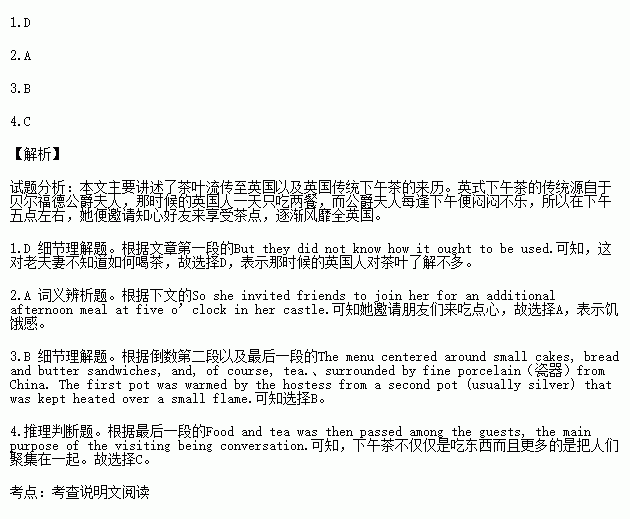题目内容
When tea was first brought to England between 1652 and 1654, it was so expensive that only the rich could buy it. It was said that an old couple had some sent to them as a great treat. But they did not know how it ought to be used. Eventually they boiled the leaves, put some of them on a piece of bacon for dinner, ate the leaves, and threw the tea soup away. However, tea quickly proved popular enough to replace ale(麦芽酒)as the national drink of England after King Charles II and his Portuguese wife began to follow this foreign tea tradition.
Before the introduction of tea into Britain, the English had two main meals — breakfast and dinner. Breakfast was ale, bread and beef. Dinner was a long, massive meal at the end of the day. It was no wonder that Anna, the Duchess of Bedford (1788 — 1861) experienced a “sinking feeling” in the late afternoon. So she invited friends to join her for an additional afternoon meal at five o’clock in her castle. The menu centered around small cakes, bread and butter sandwiches, and, of course, tea. This summer practice proved so popular that the Duchess continued it when she returned to London, sending cards to her friends asking them to join her for “tea and a walking the fields”.
The practice of inviting friends to come for tea in the afternoon was quickly picked up by other social hostesses. A common pattern of service soon came into practice. The first pot of tea was made in the kitchen and carried to the lady of the house who waited with her invited guests, surrounded by fine porcelain(瓷器)from China. The first pot was warmed by the hostess from a second pot (usually silver) that was kept heated over a small flame. Food and tea was then passed among the guests, the main purpose of the visiting being conversation.
1. The story of the old couple in Paragraph 1 is to show ____________.
A. how impolite the old couple were
B. how English people cooked tea
C. how difficult it was to introduce tea to England
D. how little English people knew about tea in those days
2.The underlined phrase “sinking feeling” in Paragraph 2 refers to a feeling of ____________.
A. hunger B. loneliness
C. thirst D. anger
3.According to the passage, the key factors of a typical afternoon tea include ____________.
a. cakes and bread
b. a massive meal
c. tea d. ale
e. fine porcelain
f. silver tea pot
g. a small flame
A. a, b, c, d, f B. a, c, e, f, g
C. a, b, e, f, g D. a, c, d, e, g
4.We can know from the passage that afternoon tea ____________.
A. leads to the wide planting and large production of tea in England
B. helps bring King Charles II and his wife together in their childhood
C. is not only an additional afternoon meal but helps bring people together
D. contributes to the increasingly high price of tea and porcelain in England
 天天向上一本好卷系列答案
天天向上一本好卷系列答案 小学生10分钟应用题系列答案
小学生10分钟应用题系列答案
